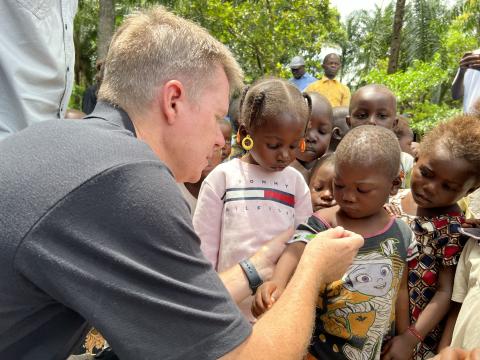Mark Kelly witnesses the Global Hunger Response saving children in DR Congo

By Patrick Abega, Communications Manager
On a visit last week to the DRC, the Southern African Regional Leader Mark Kelly visited Kwango in Western of DR Congo, where malnutrition has reached IPC 4.
"We fled the inter-communal conflict between Teke and Yaka in Kwamouth. My husband abandoned us and I don't know where he is. The host family in Kwango is not taking care of us. I have to sell firewood to feed the children. Since we arrived in September 2022, I started to notice that my child's health was deteriorating. His skin was getting lighter and his hair was becoming more and more yellow. Despite my means I tried to feed him but he had no appetite. I thought this must be malnutrition effects" says Anne, a mother of four children, one of whom is being treated at the World Vision-supported DP foyer nutrition center. Anne's daughter Ruth is among 506 children identified with malnutrition in the Pont Kwango health area alone.
Esther, another woman whose child is malnourished. With a heart full of sorrow told her daughter's story.
"Since her birth, my daughter's health has never been good. She is losing more weight. Her skin has pimples. We treated her with traditional medicine but it didn't work. We are also treating him with modern medicine but we still don't have convincing results. My husband is a military man and has been in the battlefield since 2021. We eat once a day and sometimes we don't eat. We walk 4 hours to the fields where we grow cassava. We come back very late to finally give the children something to eat" says Esther, Rosalie’s mother, a one year and four months malnourished child.
Mark has realized that the situation is critical and requires immediate attention. Hundreds of children are suffering from malnutrition in this region where World Vision is also implementing the Global Hunger Response (GHR) to address this problem.
During the visit, Mark Kelly met local officials and community members to assess the situation and identify the most urgent needs. Since the launch of the Global Hunger Response in DRC, World Vision is working closely with its partners on the ground to provide food aid, nutritional support and other essential services to children affected by malnutrition.
“Malnutrition is not just something which affects body for a point in time. Malnutrition also prohibits brain development, which is why it's so critical that we as World Vision are now responding with these young children by providing nutrition support, by providing food”, said Mark Kelly, SARO Leader after meeting with about 50 malnourished children on Positive-Deviance-Hearth project site eating their food. Out of 200 malnourished children who have been cared for by World Vision, 143 (80 girls and 63 boys) are already cured.
World Vision is committed to fighting malnutrition in Kwango and is working tirelessly to ensure that children in the area receive the support they need to recover from malnutrition and lead healthy and fulfilling lives.
To combat malnutrition in all its forms, and to facilitate access to nutritious food, World Vision, together with faith leaders and traditional leaders, has made 70 hectares of arable land available to vulnerable families for their agriculture activities. The harvest provides income and ensures a healthy diet in the target households.
“Cassava, Soya and other crops are being grown in response to malnutrition. So, children we have met today are getting immediate food but we also have other rend of chain which is production. World Vision has worked with priests, pastors and traditional leaders to provide the land then provide initial crops and trainings. So, 200 households come here to this land to grow their food. So, they can be addressing the long-term need of the children malnutrition”, added Mark Kelly.
In addition to providing immediate relief, through the Positive-Deviance-Hearth project and the distribution of food to children who recover after 12 days of treatment, World Vision addresses the underlying causes of malnutrition, such as poverty, inequality, conflict, climate change, lack of access to land and health care.